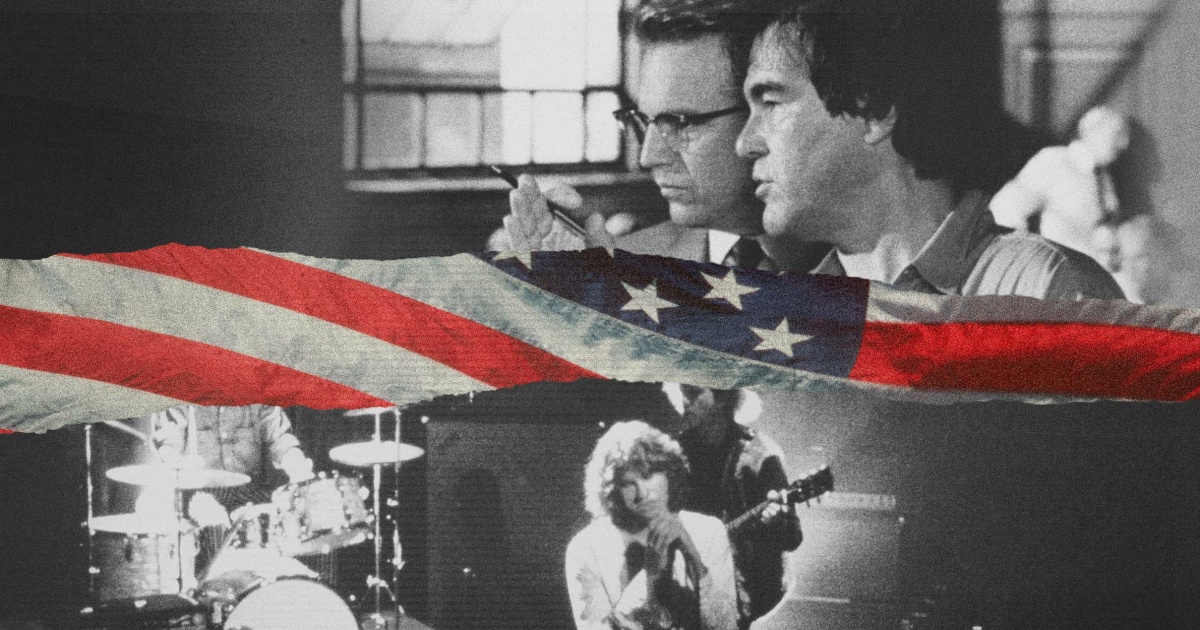
In the late 1980s and early ‘90s, few American filmmakers were as restless as Oliver Stone. He fired off seven movies from 1986 to 1991, each one a shotgun blast of confrontational ideas and virtuosic style. “Platoon” won four Oscars. “Wall Street” summed up an era of excess.
Stone was particularly busy in 1991. He started the year with “The Doors,” a psychedelic rise-and-fall biopic about the rocker Jim Morrison, played by Val Kilmer. He ended the year with “JFK,” a kaleidoscopic portrait of the hunt for truth in the wake of a national tragedy.
Thirty years later, “JFK” and “The Doors” remain fascinating artistic artifacts, brimming with the brash confidence of a director on a hot streak. They also X-ray some of the cultural fault lines that continue to divide the United States three decades later.
“JFK,” a three-hour epic featuring a stacked ensemble cast, both reflected and anticipated a country in thrall to conspiracy theories. “The Doors” dramatized the agony and ecstasy of the counterculture, revealing why the sex-and-drugs scene was seen as equal parts alluring and revolting.
The films parallel each other in striking ways. Stone, a veteran of the Vietnam War, was then Hollywood’s boldest chronicler of the 1960s, and both of his 1991 projects represent attempts to reckon with that decade’s knotty legacies. They blurred fact and fabrication, memory and myth.
In the eyes of many observers at the time, neither film was an unqualified success. “The Doors” drew mixed reviews and flailed at the box-office. “JFK” performed well on both fronts, but some historians and commentators assailed its fast-and-loose relationship with the factual record.
But in many respects, facts were beside the point.
‘Speculations’ and ‘nightmares’
In 1964, the Warren Commission concluded that President John F. Kennedy was killed by Lee Harvey Oswald and that Oswald had acted alone. Stone was far less convinced, and “JFK” was intended as his “counter-myth.”
Kevin Costner, nearing the apex of his star power and industry clout, stars as New Orleans District Attorney Jim Garrison, who investigated the events surrounding Kennedy’s assassination on Nov. 22, 1963.
Garrison’s crusade takes the viewer on a dizzying tour of midcentury American paranoia. He eyes a sprawling cast of potential culprits: the CIA, the Mafia, Cuban freedom fighters, the military-industrial complex — the shadowy men behind what Stone calls our “untold history.”
“The movie was misunderstood as advancing one particular conspiracy theory, when in fact it was exploring several,” said Matt Zoller Seitz, a veteran film critic and the author of a 2016 book about Stone’s career. “It gave the conspiracy mindset a bigger and more prestigious platform, and I think without ‘JFK’ you don’t get ‘The X-Files,’ for example.”
“JFK” is the near opposite of a by-the-books historical docudrama. The film is a lurid panorama of half-truths and speculation. Stone’s approach alienated some op-ed writers and commentators, who criticized the director months before the movie even premiered.
The columnist George Will huffed that Stone was “a man of technical skill, scant education and negligible conscience.” Walter Cronkite, the CBS newscaster who broke the news of Kennedy’s killing to the nation, reportedly decried the “mishmash of fabrications and paranoid fantasies.”
The film critic Roger Ebert offered up what might be the most salient interpretation, though, writing in a 2002 retrospective: “I have no opinion on the factual accuracy of … ‘JFK.’ I don’t think that’s the point. This is not a film about the facts of the assassination, but about the feelings.”
“I have no doubt Cronkite was correct, from his point of view. But I am a film critic and my assignment is different than his. He wants facts. I want moods, tones, fears, imaginings, whims, speculations, nightmares,” Ebert wrote.
It is here where “JFK” still reverberates in the addled, deeply fractured America of 2021 — not as a literal account of events but as a collage of issues that still tug at the national fabric, justifiably or not: distrust of government, skepticism of institutions, conspiracy theories, rabbit holes.
“I look at ‘JFK’ now and I see Covid denialists who make it seem as if the virus was created by scientists out of ‘The X-Files,’ the same ones who are going to inject us with DNA from bees, or whatever,” Seitz said. “I think there was a genie that was let out of the bottle with that movie.”
“It is a deranged film when you stand back from it,” Seitz said with a laugh.
Nevertheless, many people around the world still doubt the official narrative of the Warren Commission report and hope more information comes to light.
Jay O. Sanders, a character actor who played Lou Ivon, one of the investigators on Garrison’s team, said in an interview earlier this year that, to this day, strangers still approach him on the street and ask him who he believes killed Kennedy.
“The moment we explored in the film was one of the most important moments to countless people in this country,” Sanders said. “It was a loss of innocence. It was a loss of hope.”
‘Doors’ to self-destruction
Stone is said to have been intoxicated by The Doors ever since he first heard their music while serving in Vietnam. “The Doors,” a hallucinatory and borderline campy biopic about the dark poet of Nixon-era rock-and-roll, was the director’s acid-kissed homage.
“The Doors” charts Morrison’s rise and vertiginous descent into alcoholism, drug abuse, live-concert antics, cruelty and general R-rated debauchery. It is a frequently unflattering character study — and one that was razzed for exaggerating the musician’s behavior.
“In a way, it feels like the movie Jim Morrison would’ve hallucinated as he was dying,” Seitz said. “There’s a lot of deliberately disorienting touches … that make you feel like you’re on drugs.”
The film climaxes with a raucous concert in Miami. Kilmer’s Morrison antagonizes the audience, clashes with police officers and appears to expose himself onstage. He bellows what amounts to a personal manifesto and philosophical mission statement: “No limits! No laws!”
The movie is freewheeling but nonetheless adheres to the standard rock god biopic conventions, the stuff of the John C. Reilly parody flick “Walk Hard: The Dewey Cox Story.” It also functions as a sociopolitical Rorschach test.
You might be gripped by Stone’s reverential vision of Morrison (who died in 1971 at 27) as a counterculture prophet who urged his adoring fans to stop being “slaves” to the starchy American establishment.
But then again, you might see “The Doors” as a cautionary tale — wittingly or otherwise — about the excesses of the peace-and-love years, with Kilmer’s version of Morrison as a Dionysian narcissist who symbolized the destructiveness of heedless social rebellion.
Oliver Gruner, an academic at the University of Portsmouth in the U.K., explored these contradictions in his 2016 monograph “Screening the Sixties: Hollywood Cinema and the Politics of Memory,” a look at how the American film industry has dramatized the decade.
“Here was a film that on the one hand celebrates an individual associated with hippie lifestyles, but on the other seems vehemently skeptical of the counterculture,” Gruner wrote.
America in 2021 is still conflicted on what to make of that frenzied decade. “The Doors” is not a film about politics, yet the chaos at its core might help us understand why the norm-smashing spirit of the ‘60s split the country and riled soon-to-be-ascendant social conservatives.
In a mixed review for The New York Times, Janet Maslin offered this crisp description of Stone’s larger-than-life subject: “Nowhere did the best and worst of the ’60s collide as messily as they did in Jim Morrison.”
But in the course of 141 minutes, she wrote, Stone is not entirely “successful in offering any final assessment of either the ‘60s or his hero than in bringing both back with strange and spectacular power.” The same might be said of “JFK,” a movie of urgent questions without clear-cut answers.
But maybe that was by design.
It has been said that America never got over the ‘60s. Stone seemed to intuit as much. How can you conclude a story that never really ended?
Source: | This article originally belongs to Nbcnews.com









